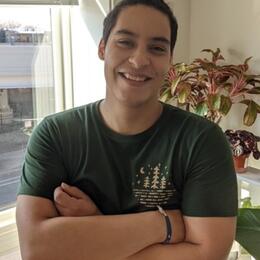Over the past decade, Audubon Great Lakes’ Habitat Restoration Internship Program has been successful at building the next generation of conservation leaders and restoring critical habitat. The Habitat Restoration program is a 16-20 week program in partnership with the Forest Preserves of Cook County (FPCC) and the Chicago Park District (CPD) focused on ecological restoration and land stewardship. Seasonal, full-time interns are provided with trainings and certifications, as well as professional development and networking opportunities.
Throughout the last 15 years, the program has grown in its scope, effectiveness and impact on the community. In 2005, the program was solely focused on restoration efforts. Today, the program is a partnership effort that hires creates a more well-rounded experience for around 10 interns annually.
Audubon Great Lakes is focusing on creating deeper connections to the communities we are a part of and work in by recruiting local, diverse candidates. During the program, interns interact with Audubon’s conservation and science, engagement, policy and advocacy and executive leadership teams. This helps interns understand how their work contributes directly to Audubon’s mission, vision and work.
Interns also have the opportunity to work alongside other professionals and expand their network while learning important skills and earning field experience. Past interns have learned plant identification skills, gained a better understanding of efficient methods for restoring ecosystems, been provided with opportunities to collaborate with other green nonprofits, and have built lasting relationships with volunteers from local Chicago communities.
A Day in the life of a Resotration Intern
During the 2021 season Audubon hired eight interns including a Crew Chief and an Assistant Crew Chief. The interns worked at Chicago Parks District's Indian Ridge Marsh (Park No. 565) and FPCC land such as Powderhorn Prairie, Kickapoo Prairie, Orland Grasslands, Whistler Woods. Throughout the program they removed invasive vegetation, collected and distributed native seeds, planted native plugs, and participated in brush pile burns.
The main objective of the restoration work is to remove invasive vegetation, non-native plants that cause harm to the ecosystem they were introduced into. These plants can reproduce rapidly either due to a large amount of seeds or an aggressive root systems that create new plants as they expand. This reproduction ability combined with a lack of natural predators allows them to out compete native plants for space and nutrients.
Interns remove invasive plants by cutting, hand-pulling or applying herbicide to them. Before interns begin this work they take courses and receive certifications on proper methods and techniques. The skills learned throughout the program are applicable to many restoration or conservation-based careers.
The program also focuses on the re-introduction of native plants and seeds into the restored lands. Interns collect seeds, and distribute them in the areas they had previously worked in. The goal is for native plants to reestablish themselves to create a more diverse ecosystem that closely resembles habitats before human interaction.
2021 Impact Numbers
- 4000+ hours of ecological restoration
- 700+ hours of field based trainings and certifications
- 230+ acres of natural areas enhanced or restored
- 800+ pounds of Invasive plants/plant material pulled
- 15 pounds of native seeds collected
Intern Feedback
“Participating in the Habitat Restoration Intern Program gave me great hands-on experience of habitat restoration and a better appreciation for Illinois natural landscapes, as well as a gained respect for plants and the role they plan in the ecosystem.” - Alex Talarski, Crew Member
“The Audubon Restoration Internship allowed me to get a better idea of how ecological conservation is carried out in real time. I have a better appreciation for the natural areas around me and the people that ensure their perseverance.” - Lindsey Bereckis, Assistant Crew Chief
“It was a great way to network and meet professionals in the field and experience what their everyday is like. I was able to get necessary certifications and appreciate the ecosystem of the Chicago region” -Colette Copic, Crew Chief
To learn more, visit: Audubon Great Lakes Restoration Internship Program landing page or contact Servando Moreno, Stewardship Program Associate at Servando.Moreno@audubon.org




